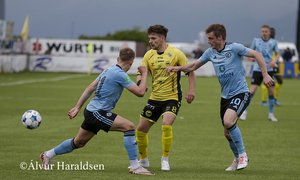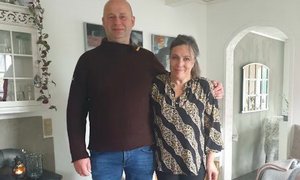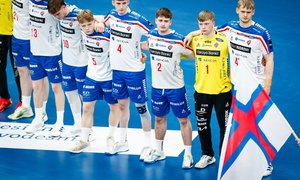Fyrr í ár varð skipað fyri samkomu fyri føroyingum í Bretlandi á donsku sendistovuni í London. Umleið 80 føroyingar og bretar møttu til hesa óføru hugnaløtu, sum eisini var ein kunning um nýggjastu oljutilgongdina í Føroyum. Ein av teimum, sum seinastu mongu árini hevur verið sum eitt slag føroyskum umboði í Bretlandi, tá tað snýr seg um at kunna um Føroyar og her serliga grindadráp, er Louis Wilson. Sonur Honnu og Harry Wilson í Hull. Louis hevur saman við øðrum føroyingum manna felagsskapin ?Faroe Island Solidarity Committee?, ið hevur roynt at kunna bretar um grindadráp í eini tíð, har umhvørvisfelagsskapir hava roynt at breiða út ósannindi um grindadráp. Louis Wilson var við til føroyska hugnakvøldið í London í februar. Og hevur hann sent blaðnum hesa hugleiðing um tað góða kvøldið.
By Louis Wilson
As the evening drew to a close with the guests singing the national anthem with pride and passion, one had the feeling that this gathering on 18 February at the Danish Embassy was the occasion when the Faroese community in the UK has come of age.
John Rajani the newly appointed as representative in Britain had invited Faroese people living in the UK as well as those with Faroese connections to a function at the Danish Embassy in London where he is based. A chance for John to meet members of the Faroese community and also for them to get to know him.
A wonderfully varied programme had been arranged. As well as being a social occasion the intention was that the evening should be informative for everyone. The talks and film about the future Oil Industry in the Faroe Islands certainly gave everyone food for thought. Eyðun Eltor the Oil Minister set the tone for the evening with a fascinating wide-ranging speech which included elements of history, philosophy, poetry as well as the spiritual. Delivered with his customary charm it had the audience captivated.
The talks by Runi Hansen and Heralvur Joensen were of necessity more technical. These together with the film gave everyone an appreciation of the mechanics of Oil exploration and exactly what progress has been made in Faroese waters. And one can only be impressed by the preparations that have already been made. To take one example the achievement in drawing up a whole new body of law to regulate the operations of Oil Industry where nothing existed before.
Jan Muller gave a thought-provoking speech about the challenges that Faroese Society faced in accommodating the coming Oil Industry. He was confident that the instinctive patriotism of Faroese people working in the Oil Industry would safeguard against the Oil Companies doing anything detrimental to the national interest.
Following the speeches, everyone was free to enjoy the buffet. A feast of mouth-watering Faroese specialities imported direct from SMS was laid out. There was skerpikjot, rullupylsur, turran fisk, drylur as well as dried grind and spik. And to wash it down, there were plentiful supplies of Restorff?s Mungat beer kindly provided by Johan Mortensen.
We were also treated to a musical interlude with Teitur Lassen and Sigrid Rasmussen singing some beautiful melodies. One could appreciate the talent which has earned Teitur such a lucrative recording contract.
The atmosphere was festive and the conversation amongst the 70 or so people who attended was animated. A whole cross section of the Faroese community in the UK was represented. There were the war brides including Nicolena Prince whose story of coming to the UK was told in the book ?Karleikur undir krignum?. There were also other ladies who married British men somewhat after coming to the UK as Au Pair Girls in the 50?s and 60?s. Then there were the confident young Faroese Professionals and Students who now find it just as natural to pursue their careers or studies in England as it was for their predecessors to look towards Denmark. The newly-appointed seamans priest Hjørdis Kjaergaard, who has been given responsibility as a pastor for the Faroese community in the UK, travelled down from Hull for the occasion.
Also present was the ?Grand Old Man? Sofus Poulsen himself who represented the Faroe Islands with such tireless energy and distinction in the years since the Second World War. Sofus has now stepped down after over 50 years in Aberdeen to hand over to John. He became established almost as a towering landmark on the North East Coast of Scotland to whom Faroese people could turn for help, advice and assistance. But times change and the focus of Faroese interests in the UK has moved south to London. The great days evoked in ?Tevatn og Breyð? of Faroese ships landing Ice Fish in Aberdeen are long gone. The connection provided by Smyril was abruptly terminated. Oil and the related Atlantic Airways service remain but London is the place where political and economic decisions are made in the UK. Hence the vital importance of the Faroe Islands being represented there.
A common theme for older generation of Faroese was the struggle to hang onto their identity and links with their homeland in the most difficult of circumstances. Travelling home in the 50?s and 60?s involved either long expeditions by sea via Denmark or Shetland or the hit and miss affair of trying to arrange passage on a Faroese trawler which had landed in a British Port. Connections between Faroese people in the UK were fragmented. Although you might have your own circle of friends there was no Foroyingafelag to bring everyone together. It would be difficult to talk of there being a Faroese community in any meaningful sense.
After the event on 18 February you have the feeling that a transformation has been completed. One had the unmistakeable impression of people collectively celebrating their identity and culture right in the middle of the great World City of London. And there was a quiet pride in seeing that there is now a new generation of young, self-confident and capable Faroese professionals like those shaping the coming Faroese Oil Industry and indeed John Rajani himself who can hold their own with anyone in the World. With John in place as an ?Ambassador? there is a sense that the Faroese have finally achieved the same status as other nationalities who have an Embassy as a link with their homeland and a base for social functions and cultural activities. In this context the sight we hope to see soon of the Faroese flag flying in Sloane Street takes on a huge symbolic value.
On a personal note, I could not but help reflect how much has improved since 1993 when I joined hands with Marjun Joensen King and Olavur Rasmussen to form the Faroe Islands Solidarity Committee (FISC). The Pilot Whale Campaign had been launched in London with the intention of ?bringing the Faroe Islands to its knees?. They had mobilised massive resources to achieve this end and even seemed to have the tacit encouragement of the British Government. At that time the Faroe Islands seemed to have very few friends in positions of influence in London ? even the Danish Embassy ignored our letters. We felt very much isolated and alone when we started our fight back against the professional campaigners of the EIA, WDCS etc. It seemed very lonely at times! Still we persevered with some success and one of our achievements was to bring together Faroese people in this country. However, with an official Representative now in place to look after Faroese interests and the development of a confident Faroese community how much better the Faroe Islands is now placed to deal with this type of threat if it should ever re-occur.














